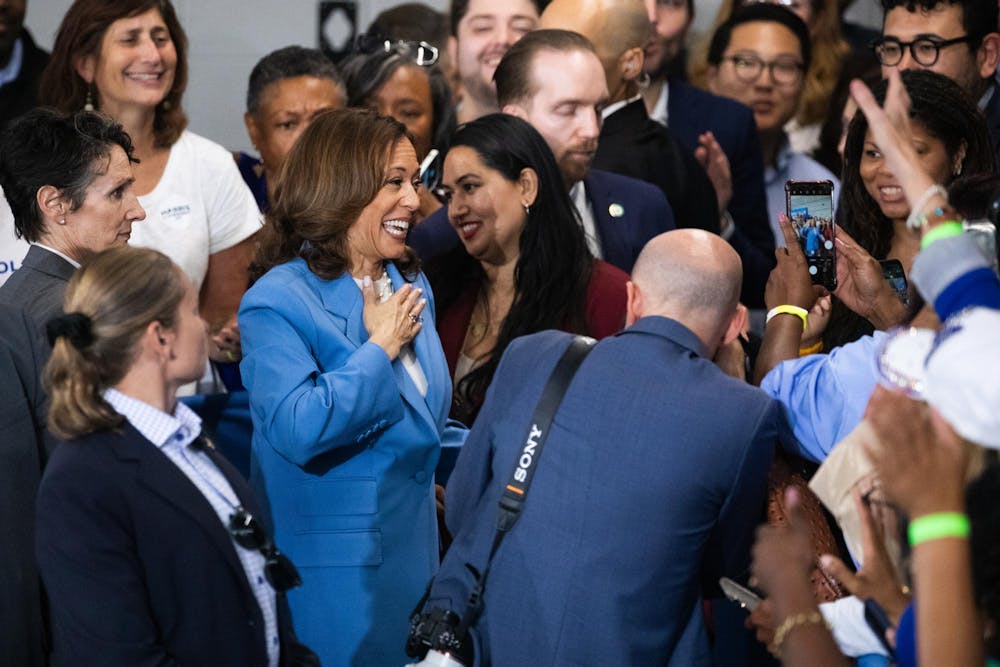The Harris-Walz campaign recently released a new ad aimed at young Black male voters. In the short 15 second clip, a man introduces himself to a group of young women. The host asks him about his occupation and his height, and he answers impeccably: he works in finance, makes six figures and is 6-foot-5 — all green flags. She follows up with a question about his plans to vote in November, and he responds that it’s not his “thing.” Immediately, a string of balloons pop as the women enthusiastically showcase their disapproval. The video ends with a call to vote and a reminder of Election Day on Nov. 5.
This ad reflects presidential candidate Kamala Harris’ desire to be relatable to her voter base and appeal to a younger crowd. The primary target is Black men, as evidenced by the video’s protagonist, and it uses pop culture to communicate its critical message: go vote.
The use of humor and relatability is a difficult balance to strike. In some ways, it's a smart, topical strategy that relies on viewers’ familiarity with trends and their short attention spans. However, using the dating show format is almost too casual and “low-brow,” bordering on a mockery of her intended audience, especially considering the serious nature of the message and its comical delivery. It does not seriously engage with undecided or unmotivated voters, using attractiveness and dateability as the impetus to vote. It reads a bit pandering in its approach, drawing on a controversial dating trend popularized for its pettiness.
Throughout her campaign, Harris has reached out to the Black community to secure the vote across the male gender, and it has been a trial of inconsistencies and near misses that reveal her struggle to communicate effectively to the Black male voter base.
In her Opportunity Agenda for Black Men, for example, she speaks directly to the needs and wants of this population, laying out plainly what her policies will do for their advancement. With five points, she focuses on the economic success and stability of Black men within and outside of their communities.
It includes a promise of a million forgivable loans to Black entrepreneurs, the institution of mentorship programs to set Black men up for success in high paying jobs, the legalization of recreational marijuana, a National Health Equity Initiative prioritizing conditions and illnesses that affect Black Americans, and — weirdly — protecting the cryptocurrency investments of Black men. It’s a plan for her presidency to empower and protect the financial, and by extension, social assets, of this population.
The release of this document asserts firmly her interest in the advancement of the Black middle class and desire to secure the Black male vote. But even this plan is inconsistent due to the bizarre inclusion of cryptocurrency, a random and poorly targeted choice that is far less relevant to her audience. It feels even less fitting next to healthcare initiatives or the decriminalization of marijuana to combat a racialized justice system.
Harris’ Opportunity Agenda is an example of her campaigning specifically to Black male voters with (mostly) meaningful and long-desired policy moves. It treats them as intelligent, rational agents to be reasoned with and convinced. This communicates the gravity and respect Harris grants Black men, but in the same breath, her campaign releases an ad that trivializes this very population.
The tonal shift and messaging may be an attempt to diversify her outreach, but the campaign instead feels gimmicky. Framing desirability as an incentive to vote does nothing to convince or encourage undecided voters, and it treats her audience as shallow. Taken together, the two moves present an incompatible perception of Black male voters that exhibits Harris’ inability to connect authentically with this demographic, whether over genuine policy concerns or even lighthearted “relatability.”




